MN5009QA: Power, Politics, and Conflict at Rogers Communications
VerifiedAdded on 2023/06/04
|9
|3238
|201
Essay
AI Summary
This essay provides an in-depth analysis of organizational power, politics, and conflict, using Rogers Communications as a case study. It explores the concepts of power in leadership and business, organizational politics, and the nature of conflicts, drawing on relevant academic theories. The essay discusses how power dynamics and political activities within Rogers Communications, particularly after the death of its founder, have led to internal conflicts and impacted the organization's productivity and image. Theories such as Pfeffer's theory of organizational politics and French and Raven’s forms of power are referenced to explain these dynamics. The report concludes with a reflective statement on the key learnings from the module.
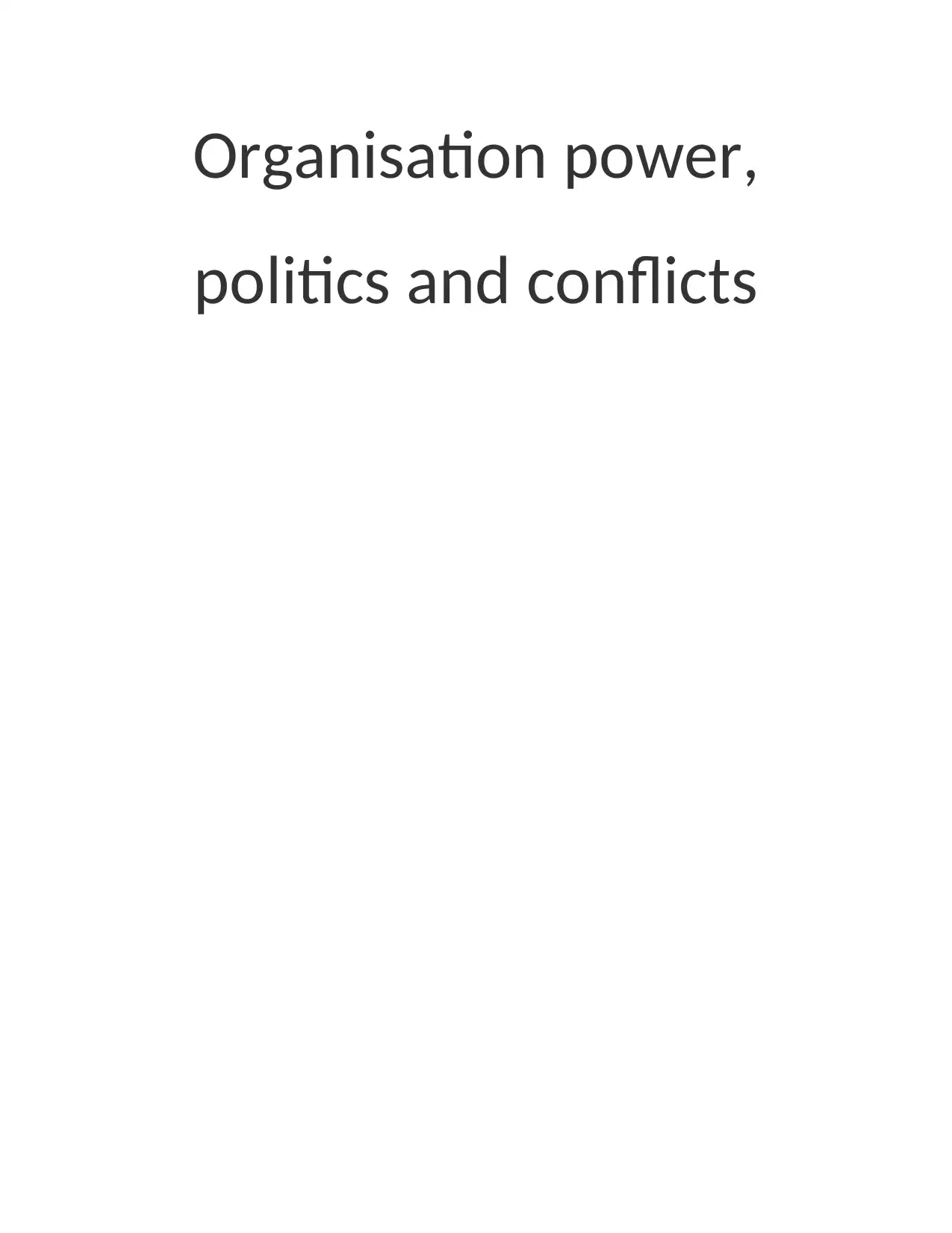
Organisation power,
politics and conflicts
politics and conflicts
Paraphrase This Document
Need a fresh take? Get an instant paraphrase of this document with our AI Paraphraser
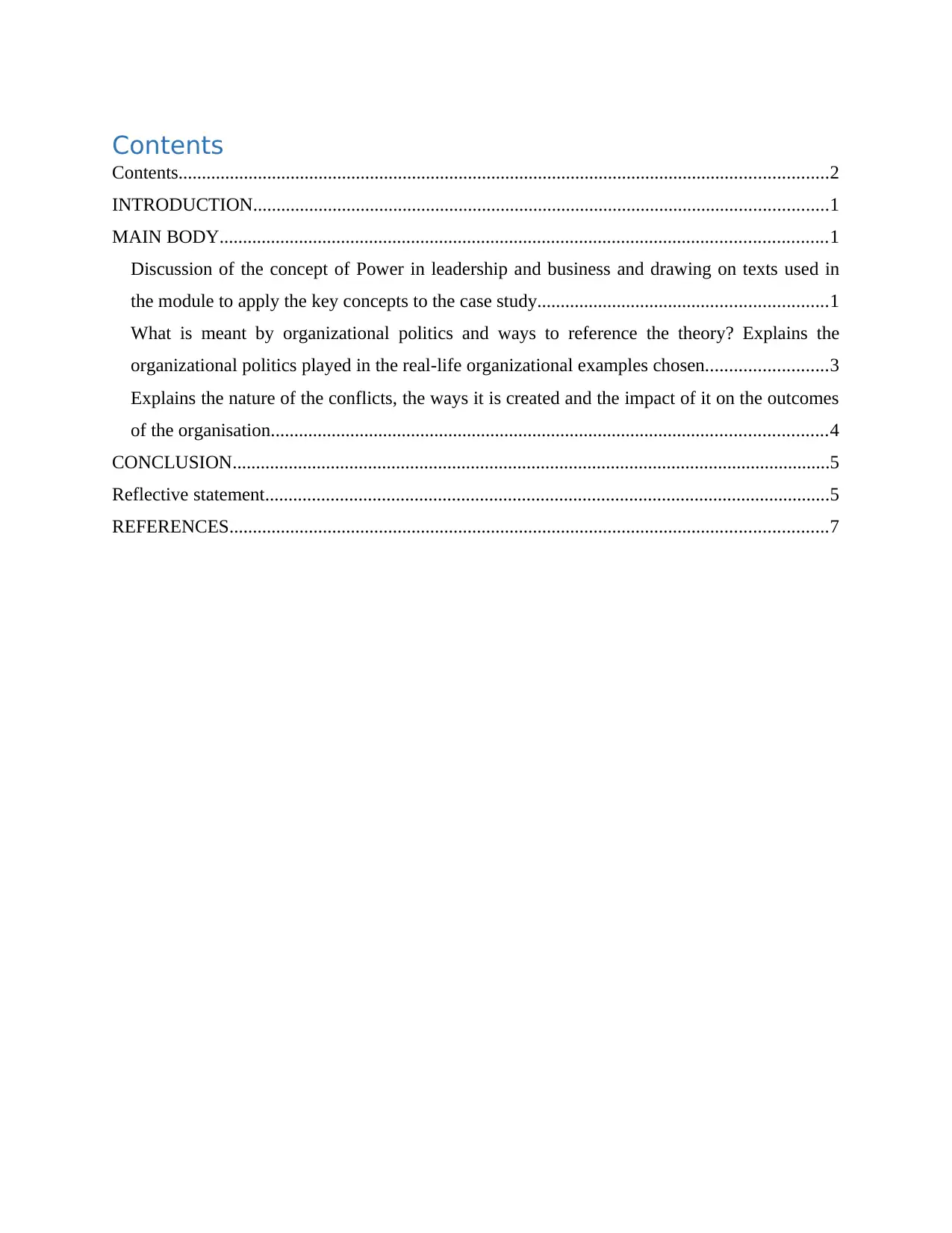
Contents
Contents...........................................................................................................................................2
INTRODUCTION...........................................................................................................................1
MAIN BODY..................................................................................................................................1
Discussion of the concept of Power in leadership and business and drawing on texts used in
the module to apply the key concepts to the case study..............................................................1
What is meant by organizational politics and ways to reference the theory? Explains the
organizational politics played in the real-life organizational examples chosen..........................3
Explains the nature of the conflicts, the ways it is created and the impact of it on the outcomes
of the organisation.......................................................................................................................4
CONCLUSION................................................................................................................................5
Reflective statement.........................................................................................................................5
REFERENCES................................................................................................................................7
Contents...........................................................................................................................................2
INTRODUCTION...........................................................................................................................1
MAIN BODY..................................................................................................................................1
Discussion of the concept of Power in leadership and business and drawing on texts used in
the module to apply the key concepts to the case study..............................................................1
What is meant by organizational politics and ways to reference the theory? Explains the
organizational politics played in the real-life organizational examples chosen..........................3
Explains the nature of the conflicts, the ways it is created and the impact of it on the outcomes
of the organisation.......................................................................................................................4
CONCLUSION................................................................................................................................5
Reflective statement.........................................................................................................................5
REFERENCES................................................................................................................................7
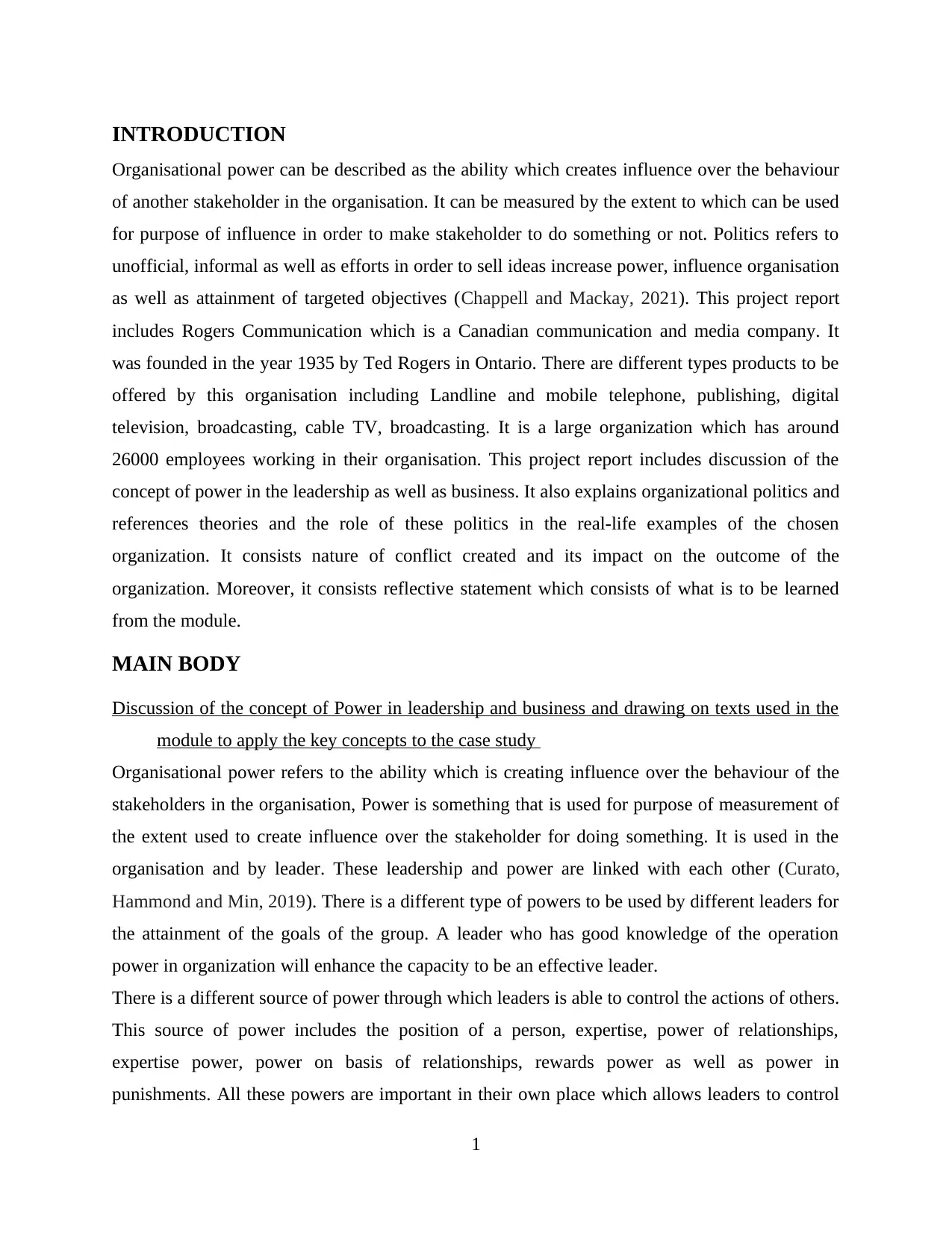
INTRODUCTION
Organisational power can be described as the ability which creates influence over the behaviour
of another stakeholder in the organisation. It can be measured by the extent to which can be used
for purpose of influence in order to make stakeholder to do something or not. Politics refers to
unofficial, informal as well as efforts in order to sell ideas increase power, influence organisation
as well as attainment of targeted objectives (Chappell and Mackay, 2021). This project report
includes Rogers Communication which is a Canadian communication and media company. It
was founded in the year 1935 by Ted Rogers in Ontario. There are different types products to be
offered by this organisation including Landline and mobile telephone, publishing, digital
television, broadcasting, cable TV, broadcasting. It is a large organization which has around
26000 employees working in their organisation. This project report includes discussion of the
concept of power in the leadership as well as business. It also explains organizational politics and
references theories and the role of these politics in the real-life examples of the chosen
organization. It consists nature of conflict created and its impact on the outcome of the
organization. Moreover, it consists reflective statement which consists of what is to be learned
from the module.
MAIN BODY
Discussion of the concept of Power in leadership and business and drawing on texts used in the
module to apply the key concepts to the case study
Organisational power refers to the ability which is creating influence over the behaviour of the
stakeholders in the organisation, Power is something that is used for purpose of measurement of
the extent used to create influence over the stakeholder for doing something. It is used in the
organisation and by leader. These leadership and power are linked with each other (Curato,
Hammond and Min, 2019). There is a different type of powers to be used by different leaders for
the attainment of the goals of the group. A leader who has good knowledge of the operation
power in organization will enhance the capacity to be an effective leader.
There is a different source of power through which leaders is able to control the actions of others.
This source of power includes the position of a person, expertise, power of relationships,
expertise power, power on basis of relationships, rewards power as well as power in
punishments. All these powers are important in their own place which allows leaders to control
1
Organisational power can be described as the ability which creates influence over the behaviour
of another stakeholder in the organisation. It can be measured by the extent to which can be used
for purpose of influence in order to make stakeholder to do something or not. Politics refers to
unofficial, informal as well as efforts in order to sell ideas increase power, influence organisation
as well as attainment of targeted objectives (Chappell and Mackay, 2021). This project report
includes Rogers Communication which is a Canadian communication and media company. It
was founded in the year 1935 by Ted Rogers in Ontario. There are different types products to be
offered by this organisation including Landline and mobile telephone, publishing, digital
television, broadcasting, cable TV, broadcasting. It is a large organization which has around
26000 employees working in their organisation. This project report includes discussion of the
concept of power in the leadership as well as business. It also explains organizational politics and
references theories and the role of these politics in the real-life examples of the chosen
organization. It consists nature of conflict created and its impact on the outcome of the
organization. Moreover, it consists reflective statement which consists of what is to be learned
from the module.
MAIN BODY
Discussion of the concept of Power in leadership and business and drawing on texts used in the
module to apply the key concepts to the case study
Organisational power refers to the ability which is creating influence over the behaviour of the
stakeholders in the organisation, Power is something that is used for purpose of measurement of
the extent used to create influence over the stakeholder for doing something. It is used in the
organisation and by leader. These leadership and power are linked with each other (Curato,
Hammond and Min, 2019). There is a different type of powers to be used by different leaders for
the attainment of the goals of the group. A leader who has good knowledge of the operation
power in organization will enhance the capacity to be an effective leader.
There is a different source of power through which leaders is able to control the actions of others.
This source of power includes the position of a person, expertise, power of relationships,
expertise power, power on basis of relationships, rewards power as well as power in
punishments. All these powers are important in their own place which allows leaders to control
1
⊘ This is a preview!⊘
Do you want full access?
Subscribe today to unlock all pages.

Trusted by 1+ million students worldwide
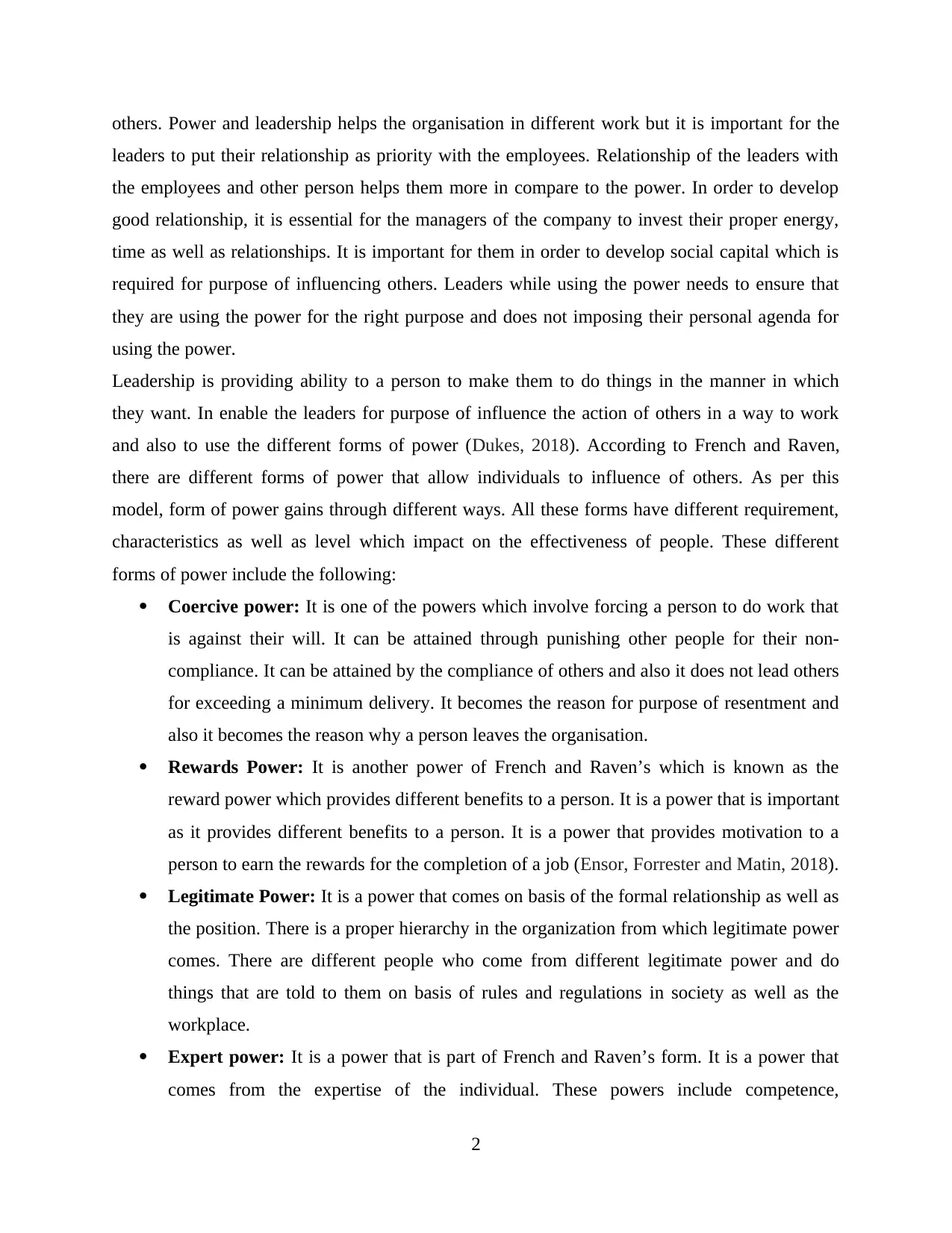
others. Power and leadership helps the organisation in different work but it is important for the
leaders to put their relationship as priority with the employees. Relationship of the leaders with
the employees and other person helps them more in compare to the power. In order to develop
good relationship, it is essential for the managers of the company to invest their proper energy,
time as well as relationships. It is important for them in order to develop social capital which is
required for purpose of influencing others. Leaders while using the power needs to ensure that
they are using the power for the right purpose and does not imposing their personal agenda for
using the power.
Leadership is providing ability to a person to make them to do things in the manner in which
they want. In enable the leaders for purpose of influence the action of others in a way to work
and also to use the different forms of power (Dukes, 2018). According to French and Raven,
there are different forms of power that allow individuals to influence of others. As per this
model, form of power gains through different ways. All these forms have different requirement,
characteristics as well as level which impact on the effectiveness of people. These different
forms of power include the following:
Coercive power: It is one of the powers which involve forcing a person to do work that
is against their will. It can be attained through punishing other people for their non-
compliance. It can be attained by the compliance of others and also it does not lead others
for exceeding a minimum delivery. It becomes the reason for purpose of resentment and
also it becomes the reason why a person leaves the organisation.
Rewards Power: It is another power of French and Raven’s which is known as the
reward power which provides different benefits to a person. It is a power that is important
as it provides different benefits to a person. It is a power that provides motivation to a
person to earn the rewards for the completion of a job (Ensor, Forrester and Matin, 2018).
Legitimate Power: It is a power that comes on basis of the formal relationship as well as
the position. There is a proper hierarchy in the organization from which legitimate power
comes. There are different people who come from different legitimate power and do
things that are told to them on basis of rules and regulations in society as well as the
workplace.
Expert power: It is a power that is part of French and Raven’s form. It is a power that
comes from the expertise of the individual. These powers include competence,
2
leaders to put their relationship as priority with the employees. Relationship of the leaders with
the employees and other person helps them more in compare to the power. In order to develop
good relationship, it is essential for the managers of the company to invest their proper energy,
time as well as relationships. It is important for them in order to develop social capital which is
required for purpose of influencing others. Leaders while using the power needs to ensure that
they are using the power for the right purpose and does not imposing their personal agenda for
using the power.
Leadership is providing ability to a person to make them to do things in the manner in which
they want. In enable the leaders for purpose of influence the action of others in a way to work
and also to use the different forms of power (Dukes, 2018). According to French and Raven,
there are different forms of power that allow individuals to influence of others. As per this
model, form of power gains through different ways. All these forms have different requirement,
characteristics as well as level which impact on the effectiveness of people. These different
forms of power include the following:
Coercive power: It is one of the powers which involve forcing a person to do work that
is against their will. It can be attained through punishing other people for their non-
compliance. It can be attained by the compliance of others and also it does not lead others
for exceeding a minimum delivery. It becomes the reason for purpose of resentment and
also it becomes the reason why a person leaves the organisation.
Rewards Power: It is another power of French and Raven’s which is known as the
reward power which provides different benefits to a person. It is a power that is important
as it provides different benefits to a person. It is a power that provides motivation to a
person to earn the rewards for the completion of a job (Ensor, Forrester and Matin, 2018).
Legitimate Power: It is a power that comes on basis of the formal relationship as well as
the position. There is a proper hierarchy in the organization from which legitimate power
comes. There are different people who come from different legitimate power and do
things that are told to them on basis of rules and regulations in society as well as the
workplace.
Expert power: It is a power that is part of French and Raven’s form. It is a power that
comes from the expertise of the individual. These powers include competence,
2
Paraphrase This Document
Need a fresh take? Get an instant paraphrase of this document with our AI Paraphraser
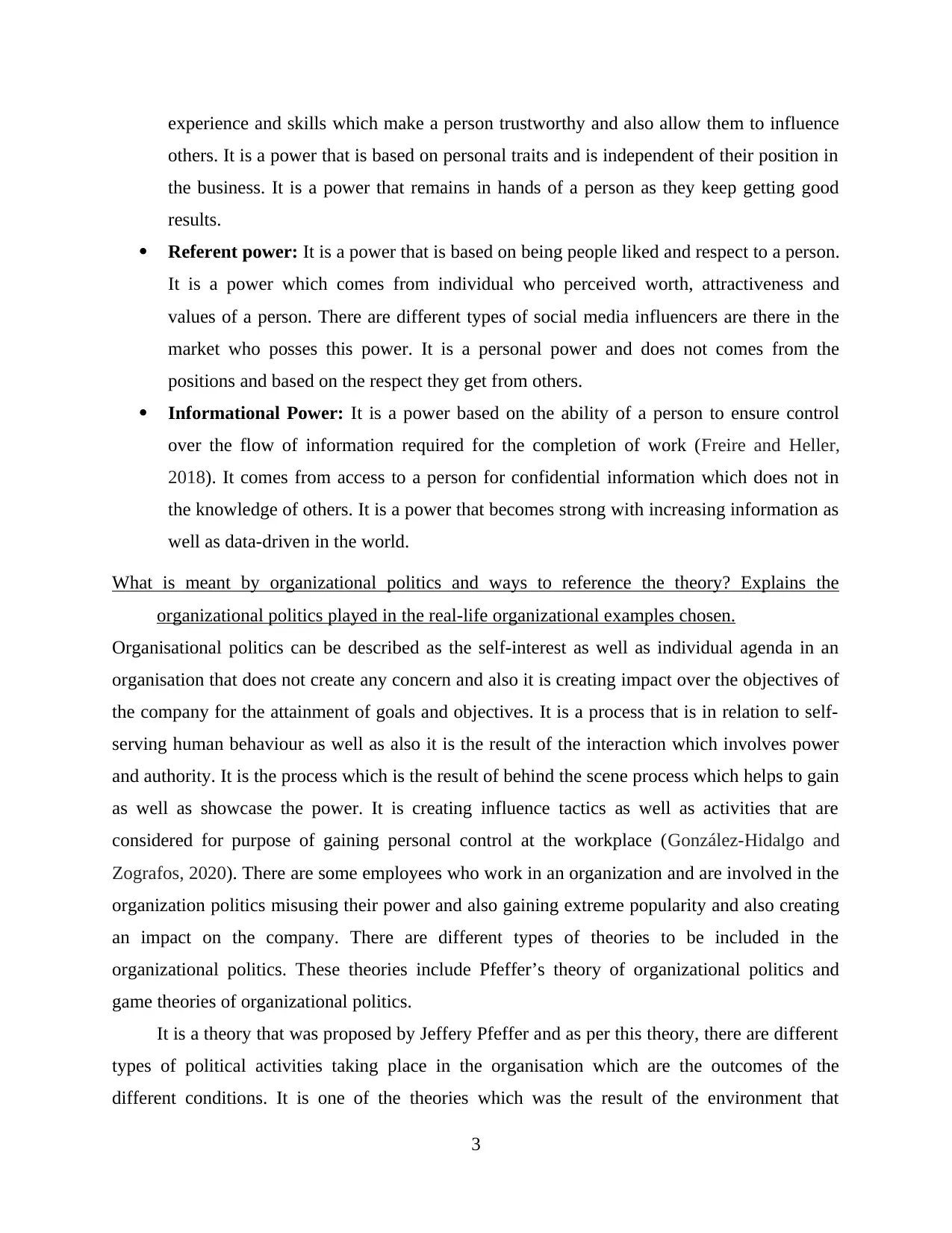
experience and skills which make a person trustworthy and also allow them to influence
others. It is a power that is based on personal traits and is independent of their position in
the business. It is a power that remains in hands of a person as they keep getting good
results.
Referent power: It is a power that is based on being people liked and respect to a person.
It is a power which comes from individual who perceived worth, attractiveness and
values of a person. There are different types of social media influencers are there in the
market who posses this power. It is a personal power and does not comes from the
positions and based on the respect they get from others.
Informational Power: It is a power based on the ability of a person to ensure control
over the flow of information required for the completion of work (Freire and Heller,
2018). It comes from access to a person for confidential information which does not in
the knowledge of others. It is a power that becomes strong with increasing information as
well as data-driven in the world.
What is meant by organizational politics and ways to reference the theory? Explains the
organizational politics played in the real-life organizational examples chosen.
Organisational politics can be described as the self-interest as well as individual agenda in an
organisation that does not create any concern and also it is creating impact over the objectives of
the company for the attainment of goals and objectives. It is a process that is in relation to self-
serving human behaviour as well as also it is the result of the interaction which involves power
and authority. It is the process which is the result of behind the scene process which helps to gain
as well as showcase the power. It is creating influence tactics as well as activities that are
considered for purpose of gaining personal control at the workplace (González-Hidalgo and
Zografos, 2020). There are some employees who work in an organization and are involved in the
organization politics misusing their power and also gaining extreme popularity and also creating
an impact on the company. There are different types of theories to be included in the
organizational politics. These theories include Pfeffer’s theory of organizational politics and
game theories of organizational politics.
It is a theory that was proposed by Jeffery Pfeffer and as per this theory, there are different
types of political activities taking place in the organisation which are the outcomes of the
different conditions. It is one of the theories which was the result of the environment that
3
others. It is a power that is based on personal traits and is independent of their position in
the business. It is a power that remains in hands of a person as they keep getting good
results.
Referent power: It is a power that is based on being people liked and respect to a person.
It is a power which comes from individual who perceived worth, attractiveness and
values of a person. There are different types of social media influencers are there in the
market who posses this power. It is a personal power and does not comes from the
positions and based on the respect they get from others.
Informational Power: It is a power based on the ability of a person to ensure control
over the flow of information required for the completion of work (Freire and Heller,
2018). It comes from access to a person for confidential information which does not in
the knowledge of others. It is a power that becomes strong with increasing information as
well as data-driven in the world.
What is meant by organizational politics and ways to reference the theory? Explains the
organizational politics played in the real-life organizational examples chosen.
Organisational politics can be described as the self-interest as well as individual agenda in an
organisation that does not create any concern and also it is creating impact over the objectives of
the company for the attainment of goals and objectives. It is a process that is in relation to self-
serving human behaviour as well as also it is the result of the interaction which involves power
and authority. It is the process which is the result of behind the scene process which helps to gain
as well as showcase the power. It is creating influence tactics as well as activities that are
considered for purpose of gaining personal control at the workplace (González-Hidalgo and
Zografos, 2020). There are some employees who work in an organization and are involved in the
organization politics misusing their power and also gaining extreme popularity and also creating
an impact on the company. There are different types of theories to be included in the
organizational politics. These theories include Pfeffer’s theory of organizational politics and
game theories of organizational politics.
It is a theory that was proposed by Jeffery Pfeffer and as per this theory, there are different
types of political activities taking place in the organisation which are the outcomes of the
different conditions. It is one of the theories which was the result of the environment that
3
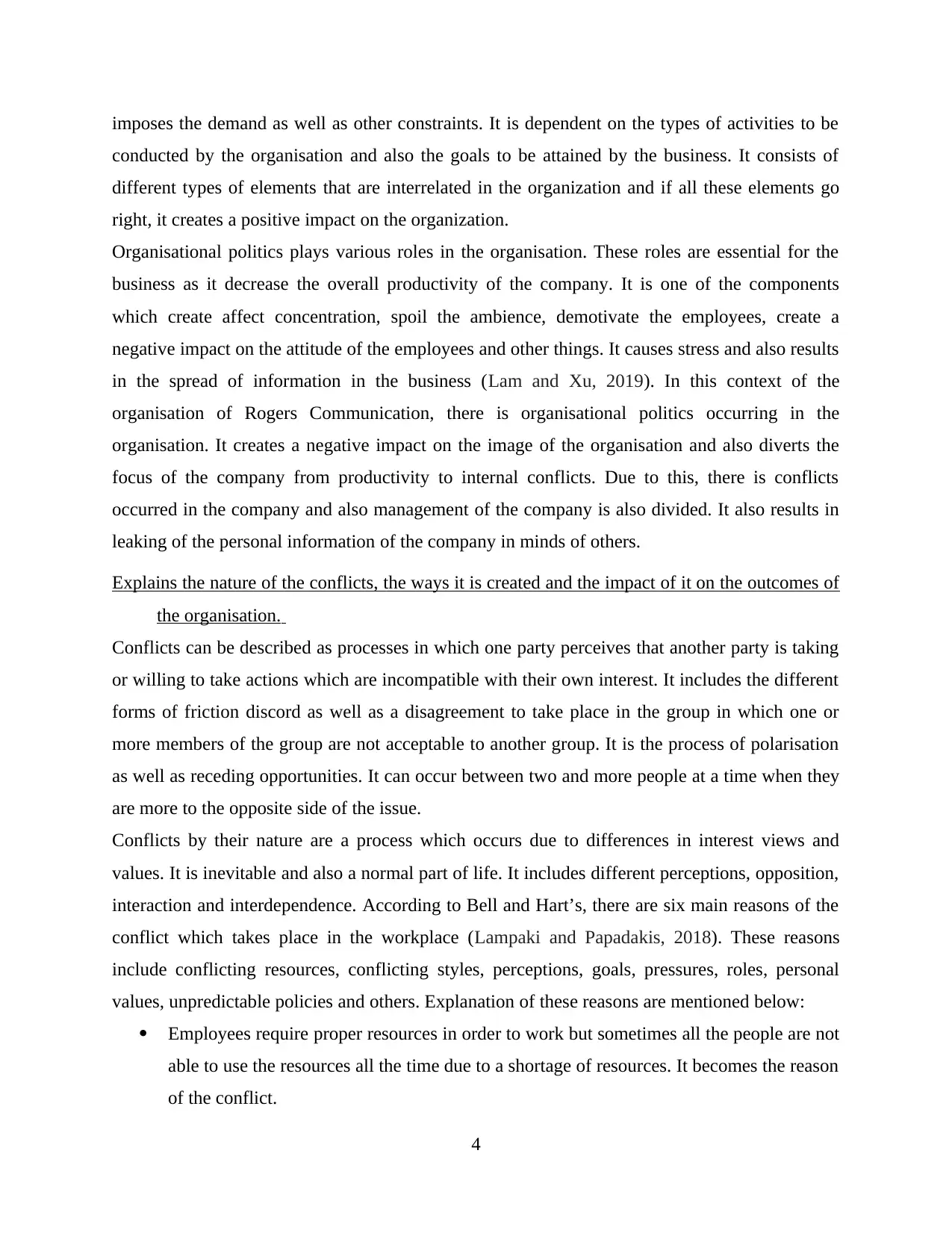
imposes the demand as well as other constraints. It is dependent on the types of activities to be
conducted by the organisation and also the goals to be attained by the business. It consists of
different types of elements that are interrelated in the organization and if all these elements go
right, it creates a positive impact on the organization.
Organisational politics plays various roles in the organisation. These roles are essential for the
business as it decrease the overall productivity of the company. It is one of the components
which create affect concentration, spoil the ambience, demotivate the employees, create a
negative impact on the attitude of the employees and other things. It causes stress and also results
in the spread of information in the business (Lam and Xu, 2019). In this context of the
organisation of Rogers Communication, there is organisational politics occurring in the
organisation. It creates a negative impact on the image of the organisation and also diverts the
focus of the company from productivity to internal conflicts. Due to this, there is conflicts
occurred in the company and also management of the company is also divided. It also results in
leaking of the personal information of the company in minds of others.
Explains the nature of the conflicts, the ways it is created and the impact of it on the outcomes of
the organisation.
Conflicts can be described as processes in which one party perceives that another party is taking
or willing to take actions which are incompatible with their own interest. It includes the different
forms of friction discord as well as a disagreement to take place in the group in which one or
more members of the group are not acceptable to another group. It is the process of polarisation
as well as receding opportunities. It can occur between two and more people at a time when they
are more to the opposite side of the issue.
Conflicts by their nature are a process which occurs due to differences in interest views and
values. It is inevitable and also a normal part of life. It includes different perceptions, opposition,
interaction and interdependence. According to Bell and Hart’s, there are six main reasons of the
conflict which takes place in the workplace (Lampaki and Papadakis, 2018). These reasons
include conflicting resources, conflicting styles, perceptions, goals, pressures, roles, personal
values, unpredictable policies and others. Explanation of these reasons are mentioned below:
Employees require proper resources in order to work but sometimes all the people are not
able to use the resources all the time due to a shortage of resources. It becomes the reason
of the conflict.
4
conducted by the organisation and also the goals to be attained by the business. It consists of
different types of elements that are interrelated in the organization and if all these elements go
right, it creates a positive impact on the organization.
Organisational politics plays various roles in the organisation. These roles are essential for the
business as it decrease the overall productivity of the company. It is one of the components
which create affect concentration, spoil the ambience, demotivate the employees, create a
negative impact on the attitude of the employees and other things. It causes stress and also results
in the spread of information in the business (Lam and Xu, 2019). In this context of the
organisation of Rogers Communication, there is organisational politics occurring in the
organisation. It creates a negative impact on the image of the organisation and also diverts the
focus of the company from productivity to internal conflicts. Due to this, there is conflicts
occurred in the company and also management of the company is also divided. It also results in
leaking of the personal information of the company in minds of others.
Explains the nature of the conflicts, the ways it is created and the impact of it on the outcomes of
the organisation.
Conflicts can be described as processes in which one party perceives that another party is taking
or willing to take actions which are incompatible with their own interest. It includes the different
forms of friction discord as well as a disagreement to take place in the group in which one or
more members of the group are not acceptable to another group. It is the process of polarisation
as well as receding opportunities. It can occur between two and more people at a time when they
are more to the opposite side of the issue.
Conflicts by their nature are a process which occurs due to differences in interest views and
values. It is inevitable and also a normal part of life. It includes different perceptions, opposition,
interaction and interdependence. According to Bell and Hart’s, there are six main reasons of the
conflict which takes place in the workplace (Lampaki and Papadakis, 2018). These reasons
include conflicting resources, conflicting styles, perceptions, goals, pressures, roles, personal
values, unpredictable policies and others. Explanation of these reasons are mentioned below:
Employees require proper resources in order to work but sometimes all the people are not
able to use the resources all the time due to a shortage of resources. It becomes the reason
of the conflict.
4
⊘ This is a preview!⊘
Do you want full access?
Subscribe today to unlock all pages.

Trusted by 1+ million students worldwide
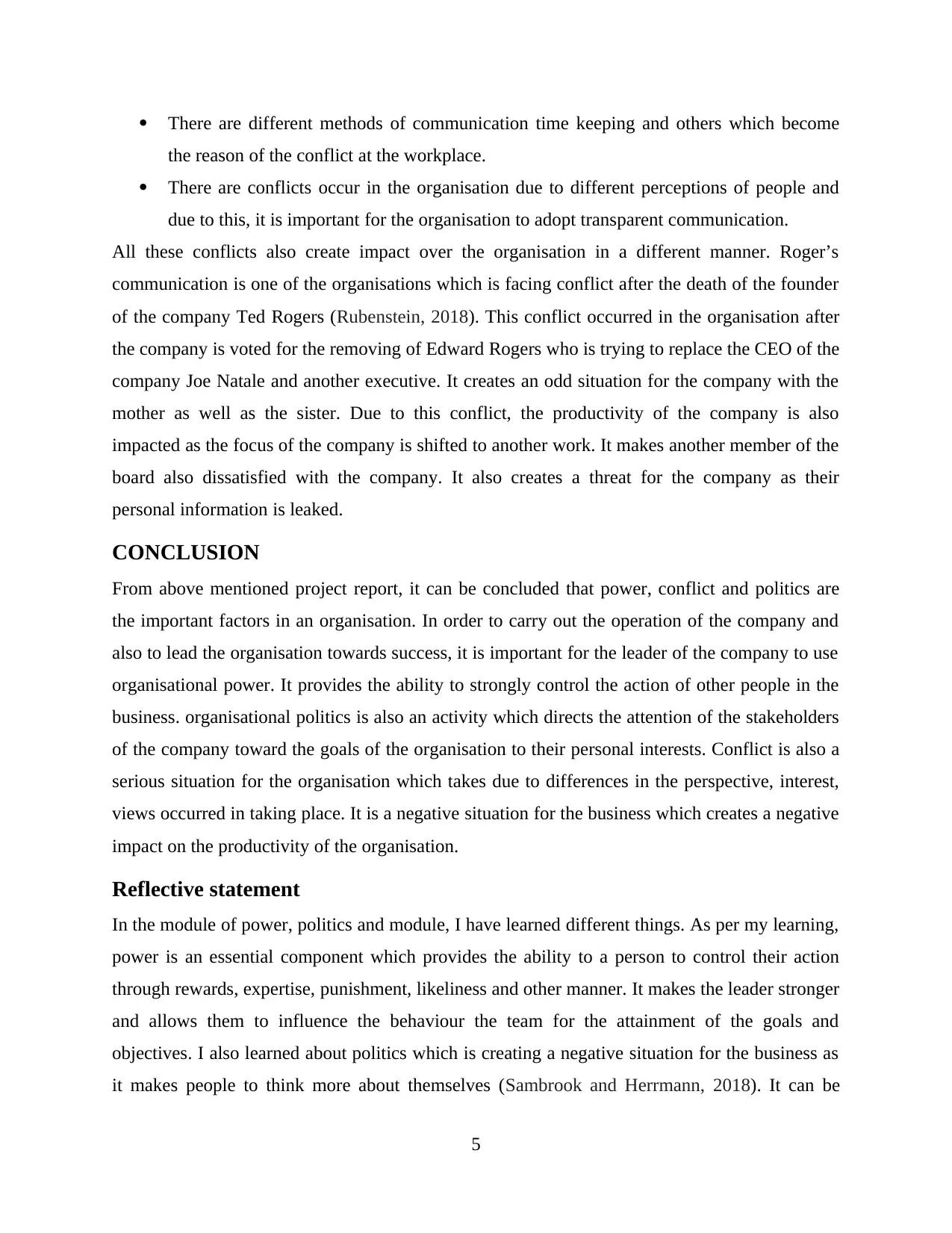
There are different methods of communication time keeping and others which become
the reason of the conflict at the workplace.
There are conflicts occur in the organisation due to different perceptions of people and
due to this, it is important for the organisation to adopt transparent communication.
All these conflicts also create impact over the organisation in a different manner. Roger’s
communication is one of the organisations which is facing conflict after the death of the founder
of the company Ted Rogers (Rubenstein, 2018). This conflict occurred in the organisation after
the company is voted for the removing of Edward Rogers who is trying to replace the CEO of the
company Joe Natale and another executive. It creates an odd situation for the company with the
mother as well as the sister. Due to this conflict, the productivity of the company is also
impacted as the focus of the company is shifted to another work. It makes another member of the
board also dissatisfied with the company. It also creates a threat for the company as their
personal information is leaked.
CONCLUSION
From above mentioned project report, it can be concluded that power, conflict and politics are
the important factors in an organisation. In order to carry out the operation of the company and
also to lead the organisation towards success, it is important for the leader of the company to use
organisational power. It provides the ability to strongly control the action of other people in the
business. organisational politics is also an activity which directs the attention of the stakeholders
of the company toward the goals of the organisation to their personal interests. Conflict is also a
serious situation for the organisation which takes due to differences in the perspective, interest,
views occurred in taking place. It is a negative situation for the business which creates a negative
impact on the productivity of the organisation.
Reflective statement
In the module of power, politics and module, I have learned different things. As per my learning,
power is an essential component which provides the ability to a person to control their action
through rewards, expertise, punishment, likeliness and other manner. It makes the leader stronger
and allows them to influence the behaviour the team for the attainment of the goals and
objectives. I also learned about politics which is creating a negative situation for the business as
it makes people to think more about themselves (Sambrook and Herrmann, 2018). It can be
5
the reason of the conflict at the workplace.
There are conflicts occur in the organisation due to different perceptions of people and
due to this, it is important for the organisation to adopt transparent communication.
All these conflicts also create impact over the organisation in a different manner. Roger’s
communication is one of the organisations which is facing conflict after the death of the founder
of the company Ted Rogers (Rubenstein, 2018). This conflict occurred in the organisation after
the company is voted for the removing of Edward Rogers who is trying to replace the CEO of the
company Joe Natale and another executive. It creates an odd situation for the company with the
mother as well as the sister. Due to this conflict, the productivity of the company is also
impacted as the focus of the company is shifted to another work. It makes another member of the
board also dissatisfied with the company. It also creates a threat for the company as their
personal information is leaked.
CONCLUSION
From above mentioned project report, it can be concluded that power, conflict and politics are
the important factors in an organisation. In order to carry out the operation of the company and
also to lead the organisation towards success, it is important for the leader of the company to use
organisational power. It provides the ability to strongly control the action of other people in the
business. organisational politics is also an activity which directs the attention of the stakeholders
of the company toward the goals of the organisation to their personal interests. Conflict is also a
serious situation for the organisation which takes due to differences in the perspective, interest,
views occurred in taking place. It is a negative situation for the business which creates a negative
impact on the productivity of the organisation.
Reflective statement
In the module of power, politics and module, I have learned different things. As per my learning,
power is an essential component which provides the ability to a person to control their action
through rewards, expertise, punishment, likeliness and other manner. It makes the leader stronger
and allows them to influence the behaviour the team for the attainment of the goals and
objectives. I also learned about politics which is creating a negative situation for the business as
it makes people to think more about themselves (Sambrook and Herrmann, 2018). It can be
5
Paraphrase This Document
Need a fresh take? Get an instant paraphrase of this document with our AI Paraphraser
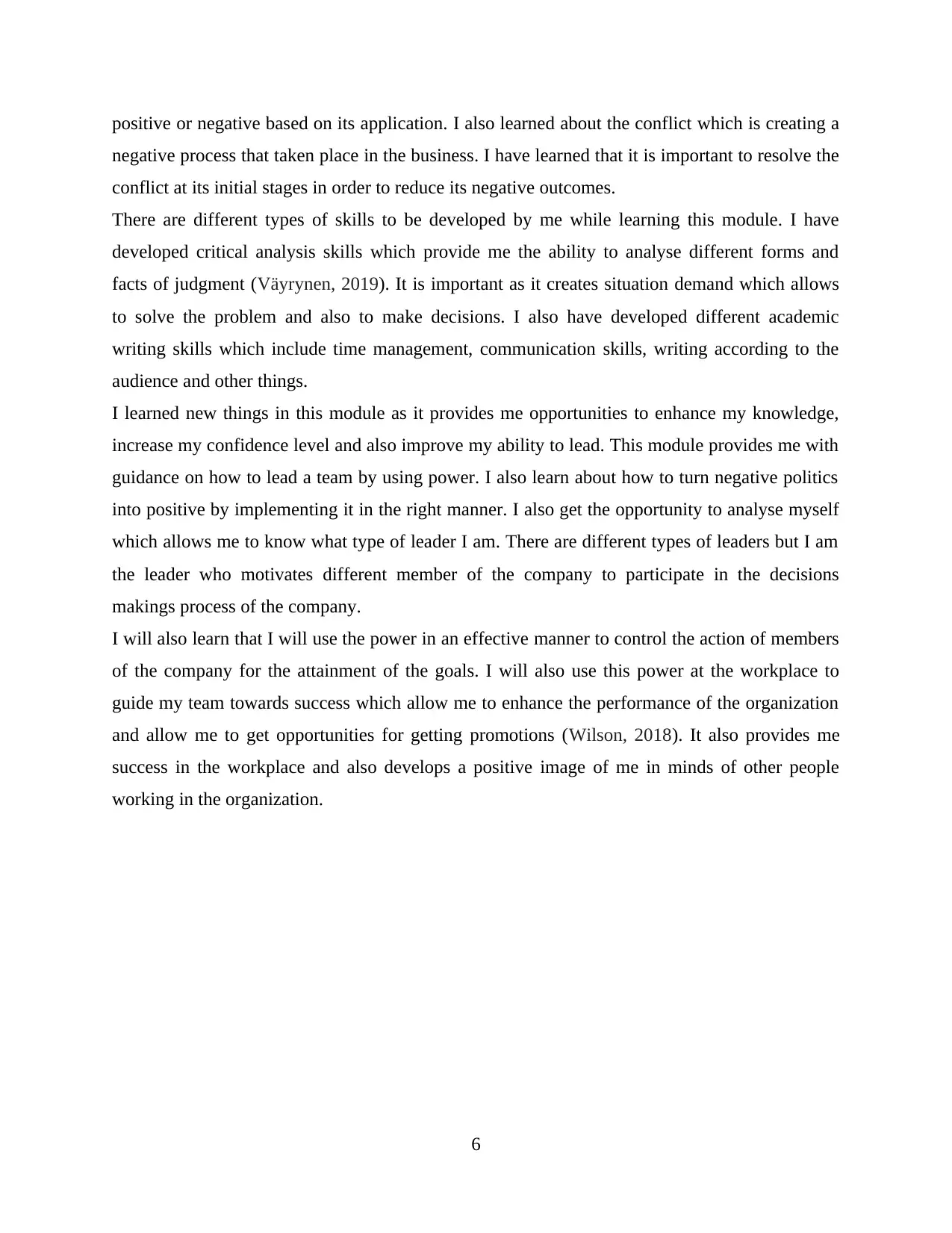
positive or negative based on its application. I also learned about the conflict which is creating a
negative process that taken place in the business. I have learned that it is important to resolve the
conflict at its initial stages in order to reduce its negative outcomes.
There are different types of skills to be developed by me while learning this module. I have
developed critical analysis skills which provide me the ability to analyse different forms and
facts of judgment (Väyrynen, 2019). It is important as it creates situation demand which allows
to solve the problem and also to make decisions. I also have developed different academic
writing skills which include time management, communication skills, writing according to the
audience and other things.
I learned new things in this module as it provides me opportunities to enhance my knowledge,
increase my confidence level and also improve my ability to lead. This module provides me with
guidance on how to lead a team by using power. I also learn about how to turn negative politics
into positive by implementing it in the right manner. I also get the opportunity to analyse myself
which allows me to know what type of leader I am. There are different types of leaders but I am
the leader who motivates different member of the company to participate in the decisions
makings process of the company.
I will also learn that I will use the power in an effective manner to control the action of members
of the company for the attainment of the goals. I will also use this power at the workplace to
guide my team towards success which allow me to enhance the performance of the organization
and allow me to get opportunities for getting promotions (Wilson, 2018). It also provides me
success in the workplace and also develops a positive image of me in minds of other people
working in the organization.
6
negative process that taken place in the business. I have learned that it is important to resolve the
conflict at its initial stages in order to reduce its negative outcomes.
There are different types of skills to be developed by me while learning this module. I have
developed critical analysis skills which provide me the ability to analyse different forms and
facts of judgment (Väyrynen, 2019). It is important as it creates situation demand which allows
to solve the problem and also to make decisions. I also have developed different academic
writing skills which include time management, communication skills, writing according to the
audience and other things.
I learned new things in this module as it provides me opportunities to enhance my knowledge,
increase my confidence level and also improve my ability to lead. This module provides me with
guidance on how to lead a team by using power. I also learn about how to turn negative politics
into positive by implementing it in the right manner. I also get the opportunity to analyse myself
which allows me to know what type of leader I am. There are different types of leaders but I am
the leader who motivates different member of the company to participate in the decisions
makings process of the company.
I will also learn that I will use the power in an effective manner to control the action of members
of the company for the attainment of the goals. I will also use this power at the workplace to
guide my team towards success which allow me to enhance the performance of the organization
and allow me to get opportunities for getting promotions (Wilson, 2018). It also provides me
success in the workplace and also develops a positive image of me in minds of other people
working in the organization.
6
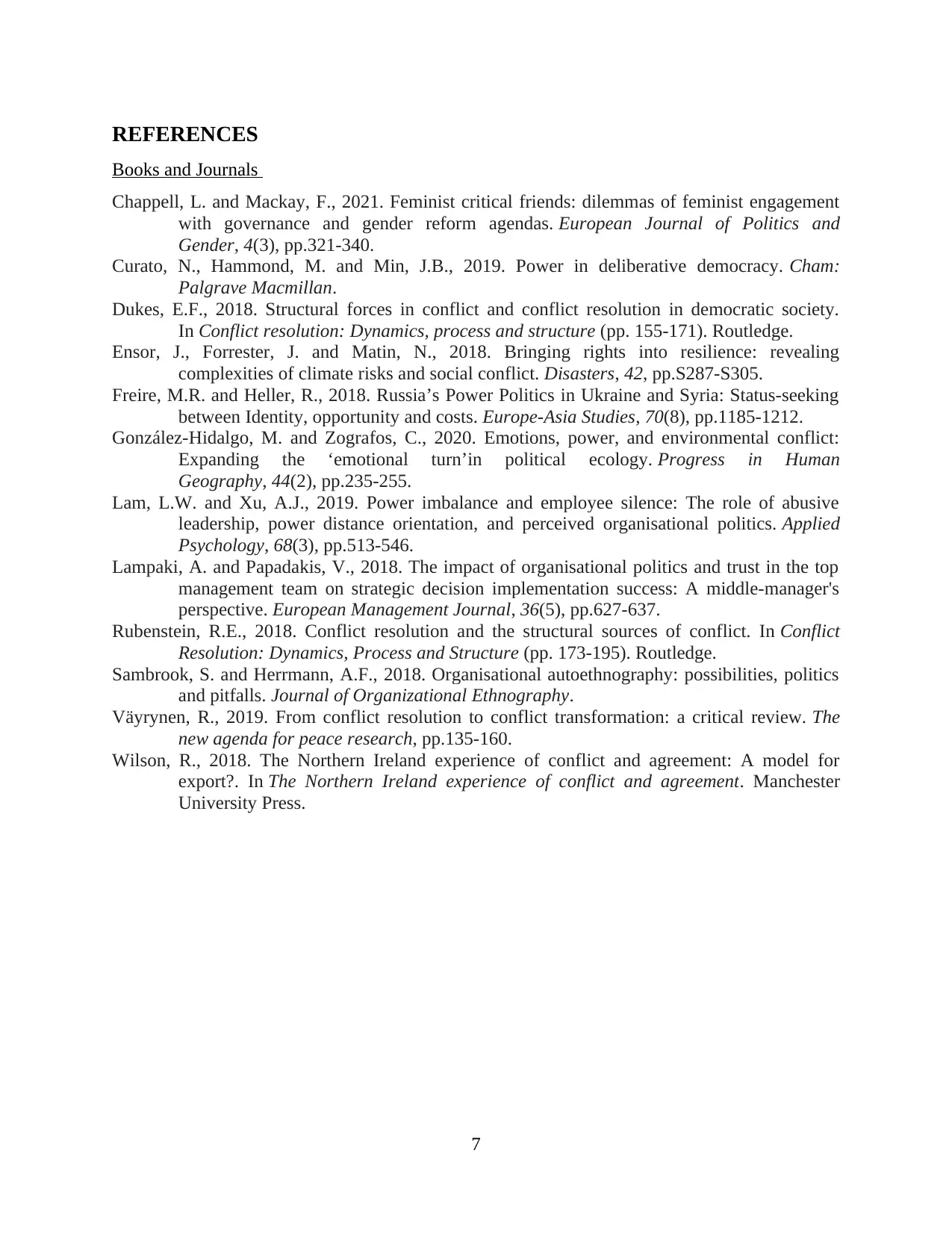
REFERENCES
Books and Journals
Chappell, L. and Mackay, F., 2021. Feminist critical friends: dilemmas of feminist engagement
with governance and gender reform agendas. European Journal of Politics and
Gender, 4(3), pp.321-340.
Curato, N., Hammond, M. and Min, J.B., 2019. Power in deliberative democracy. Cham:
Palgrave Macmillan.
Dukes, E.F., 2018. Structural forces in conflict and conflict resolution in democratic society.
In Conflict resolution: Dynamics, process and structure (pp. 155-171). Routledge.
Ensor, J., Forrester, J. and Matin, N., 2018. Bringing rights into resilience: revealing
complexities of climate risks and social conflict. Disasters, 42, pp.S287-S305.
Freire, M.R. and Heller, R., 2018. Russia’s Power Politics in Ukraine and Syria: Status-seeking
between Identity, opportunity and costs. Europe-Asia Studies, 70(8), pp.1185-1212.
González-Hidalgo, M. and Zografos, C., 2020. Emotions, power, and environmental conflict:
Expanding the ‘emotional turn’in political ecology. Progress in Human
Geography, 44(2), pp.235-255.
Lam, L.W. and Xu, A.J., 2019. Power imbalance and employee silence: The role of abusive
leadership, power distance orientation, and perceived organisational politics. Applied
Psychology, 68(3), pp.513-546.
Lampaki, A. and Papadakis, V., 2018. The impact of organisational politics and trust in the top
management team on strategic decision implementation success: A middle-manager's
perspective. European Management Journal, 36(5), pp.627-637.
Rubenstein, R.E., 2018. Conflict resolution and the structural sources of conflict. In Conflict
Resolution: Dynamics, Process and Structure (pp. 173-195). Routledge.
Sambrook, S. and Herrmann, A.F., 2018. Organisational autoethnography: possibilities, politics
and pitfalls. Journal of Organizational Ethnography.
Väyrynen, R., 2019. From conflict resolution to conflict transformation: a critical review. The
new agenda for peace research, pp.135-160.
Wilson, R., 2018. The Northern Ireland experience of conflict and agreement: A model for
export?. In The Northern Ireland experience of conflict and agreement. Manchester
University Press.
7
Books and Journals
Chappell, L. and Mackay, F., 2021. Feminist critical friends: dilemmas of feminist engagement
with governance and gender reform agendas. European Journal of Politics and
Gender, 4(3), pp.321-340.
Curato, N., Hammond, M. and Min, J.B., 2019. Power in deliberative democracy. Cham:
Palgrave Macmillan.
Dukes, E.F., 2018. Structural forces in conflict and conflict resolution in democratic society.
In Conflict resolution: Dynamics, process and structure (pp. 155-171). Routledge.
Ensor, J., Forrester, J. and Matin, N., 2018. Bringing rights into resilience: revealing
complexities of climate risks and social conflict. Disasters, 42, pp.S287-S305.
Freire, M.R. and Heller, R., 2018. Russia’s Power Politics in Ukraine and Syria: Status-seeking
between Identity, opportunity and costs. Europe-Asia Studies, 70(8), pp.1185-1212.
González-Hidalgo, M. and Zografos, C., 2020. Emotions, power, and environmental conflict:
Expanding the ‘emotional turn’in political ecology. Progress in Human
Geography, 44(2), pp.235-255.
Lam, L.W. and Xu, A.J., 2019. Power imbalance and employee silence: The role of abusive
leadership, power distance orientation, and perceived organisational politics. Applied
Psychology, 68(3), pp.513-546.
Lampaki, A. and Papadakis, V., 2018. The impact of organisational politics and trust in the top
management team on strategic decision implementation success: A middle-manager's
perspective. European Management Journal, 36(5), pp.627-637.
Rubenstein, R.E., 2018. Conflict resolution and the structural sources of conflict. In Conflict
Resolution: Dynamics, Process and Structure (pp. 173-195). Routledge.
Sambrook, S. and Herrmann, A.F., 2018. Organisational autoethnography: possibilities, politics
and pitfalls. Journal of Organizational Ethnography.
Väyrynen, R., 2019. From conflict resolution to conflict transformation: a critical review. The
new agenda for peace research, pp.135-160.
Wilson, R., 2018. The Northern Ireland experience of conflict and agreement: A model for
export?. In The Northern Ireland experience of conflict and agreement. Manchester
University Press.
7
⊘ This is a preview!⊘
Do you want full access?
Subscribe today to unlock all pages.

Trusted by 1+ million students worldwide
1 out of 9
Related Documents
Your All-in-One AI-Powered Toolkit for Academic Success.
+13062052269
info@desklib.com
Available 24*7 on WhatsApp / Email
![[object Object]](/_next/static/media/star-bottom.7253800d.svg)
Unlock your academic potential
Copyright © 2020–2025 A2Z Services. All Rights Reserved. Developed and managed by ZUCOL.





